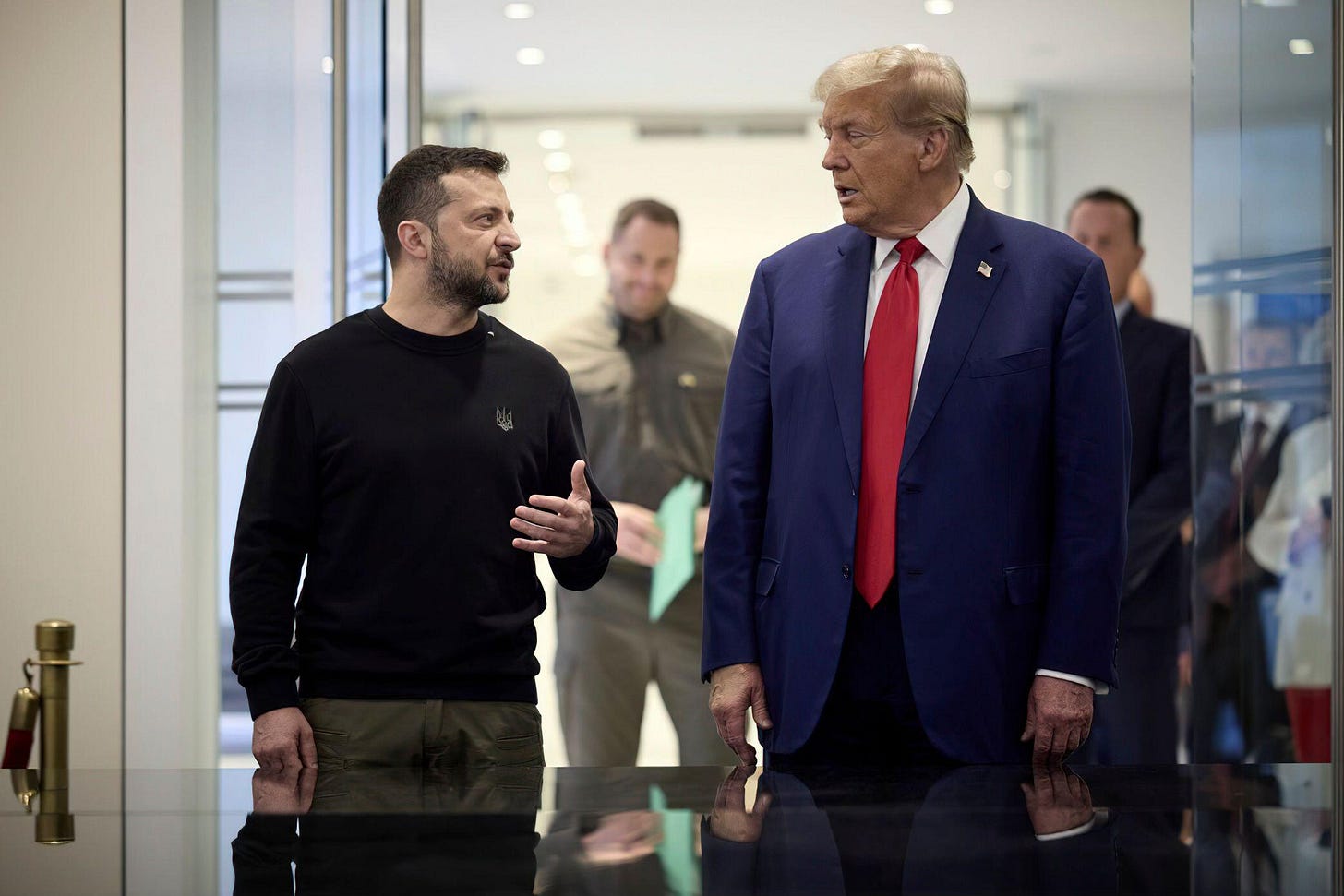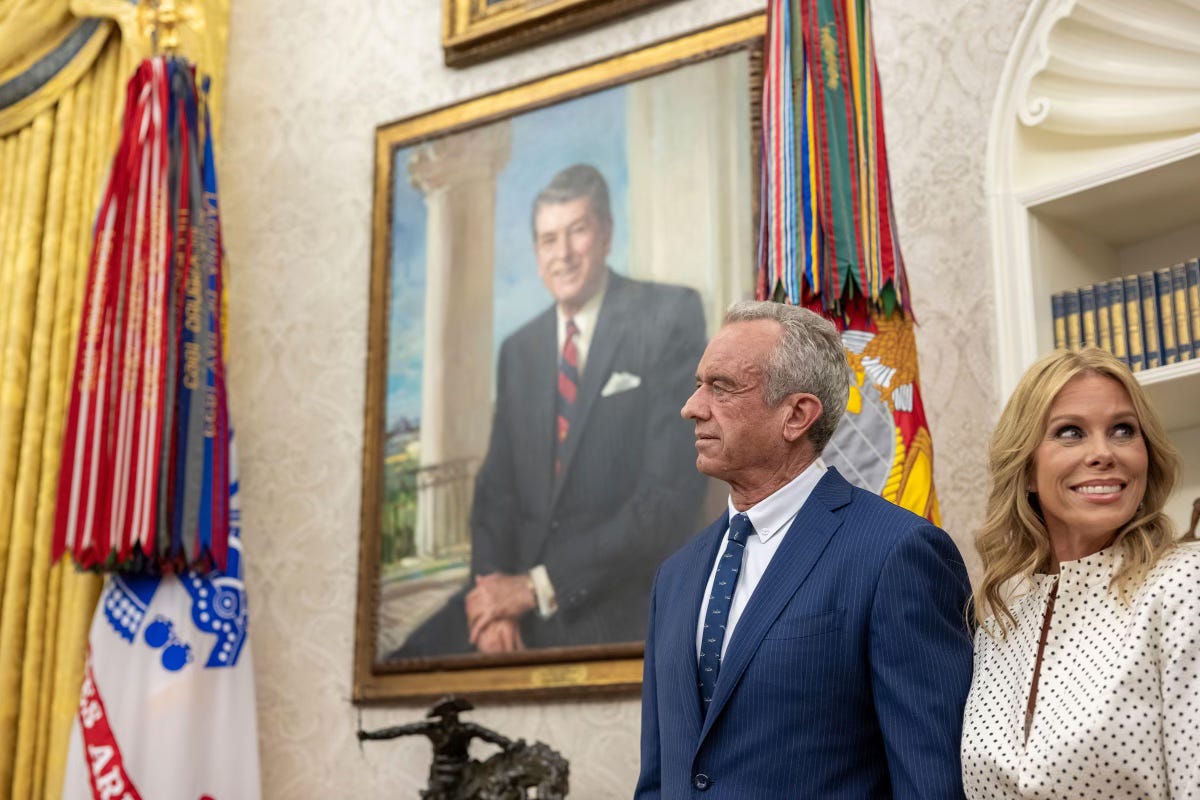Trump inverts reality as he lambasts Zelensky
The US President has lashed out at a “dictator without elections” who is allegedly responsible for starting the war in Ukraine.
In an extraordinary turn of events, or indeed inversion of reality, Ukraine’s most vital ally has lashed out at a “dictator without elections” who is allegedly responsible for starting the war in Ukraine.
The dictator in question being not Vladimir Putin, but rather Volodymyr Zelensky.
“Zelensky better move fast or he is not going to have a country left,” said Donald Trump on Truth Social this evening, accusing the “modestly successful comedian” of duping the US into “spending $350 billion dollars, to go into a war that couldn’t be won”.
This was an angry rebuke to the Ukrainian president’s claims earlier in the day that Trump was “surrounded by misinformation”. A comment which was itself a response to a stunning flurry of claims made by Trump yesterday, in which the leader of the free world parroted Putin’s propaganda.
Speaking in Florida last night, Trump adopted the Kremlin’s narrative on the origin of the war, painting Kyiv as the aggressor, as he declared: “Ukraine should have never started it.”
He also took issue with Zelensky’s apparent unpopularity, claiming - falsely - that “he’s got a 4 per cent approval rating”. And he echoed the Kremlin in suggesting that Zelensky lacks legitimacy until he holds an election.
It’s unclear what the source of Trump’s 4 per cent claim is. According to a survey conducted this month by the Ukraine-based Kyiv International Institute of Sociology, 57 per cent of Ukrainians trust the president. That’s down from 77 per cent at the end of 2023 and a significant drop from his 90 per cent approval rating in May 2022. Though the chances of a free and fair vote in Ukraine electing any pro-Kremlin candidate in his place are extremely slim. If Zelensky was to be beaten by anyone, it would most likely be his former army chief Valerii Zaluzhnyi, who has marginally overtaken Zelensky in several polls.
As for Zelensky’s refusal to hold elections, his first five-year term in office was due to come to an end in May 2024. However, in November, all parties in Ukraine's parliament backed postponing elections until the war is over, after which Zelensky has vowed to hold a new election.
Zelensky has also contested Trump’s US aid figure - insisting the real figure for America’s overall support for Kyiv over the past three years comes to closer to $100 bn - as opposed to the $350bn figure Trump provided today, or the $500bn figure Trump gave yesterday.
The brutal stalemate in Ukraine has helped to strengthen Trump’s case for peace negotiations to end the bloodshed. However Washington’s dramatic policy shift is increasingly looking less like realpolitik and rather more like the biggest betrayal of an ally in recent geopolitical history.
Trump’s Ukraine envoy, Keith Kellog, is in Kyiv today where he will be making efforts to persuade officials that the US is not selling Ukraine out to Russia. Though Trump’s stunning attack on the Ukrainian president will have made his task rather trickier.
Another reason why Trump doubled down on his criticism of Zelensky this evening may well be the public confirmation from Kyiv this morning that it has rejected the first draft of a rare earth minerals agreement with the US that would have granted Washington $500 billion in minerals as well as access to ports, oil, and gas in return for the support the US has provided to help it fend off Putin’s full-scale invasion.
The Telegraph’s Ambrose Evans-Pritchard, who got hold of a leaked draft contract, says the proposals amount to “the US economic colonisation of Ukraine, in legal perpetuity,” and require Kyiv to give up a bigger share of its GDP than the reparations imposed on Germany at Versailles.
Yet the crucial sticking point, as far as Zelensky is concerned, is the fact that, despite granting Washington “50 per cent ownership of Ukraine’s materials”, the document “made no mention of security guarantees”.
Antony Beevor sums it up succinctly in Engelsberg Ideas, “Trump’s arrogance and irresponsibility is simply breathtaking. He insists on dictating a settlement that he is not even prepared to guarantee in any way.”
Others are keen to remind the Trump administration of the 1994 Budapest Memorandum.
If Kyiv had nukes, Russia would almost certainly never have invaded Ukrainian soil. But, in 1994, Ukraine committed to full nuclear disarmament in exchange for sovereignty and security assurances from the Russia, the UK and the US.
Which brings us back to the theme of betrayal.
Caitlin Allen
Deputy Editor
ON REACTION TODAY
David Waywell
RFK Jr's mad experiment will upend America’s approach to healthcare
ALSO KNOW
UK inflation rises at fastest pace for 10 months - Inflation rose to 3 per cent last month, up from 2.5 per cent in December. This bigger-than-expected jump was driven largely by higher costs for food, transport and private school fees.
EV backlash - Unions have warned that thousands of jobs are at risk if the government does not water down its electric vehicle targets. Unite, Labour’s biggest union backer, labelled the mandate a “blunt tool”.
UK’s life expectancy growth stalls - Between 2011 and 2019, life expectancy in England rose at the slowest rate of any European country, according to research published in the Lancet Public Health journal. Experts are blaming this on a mix of poor diet, mass inactivity and soaring obesity.
Bolsonaro’s alleged poison plot - Former Brazilian president Jair Bolsonaro has been charged by prosecutors over allegedly masterminding a plot to cling to power through a military coup, following his 2022 election defeat. The South American country’s attorney general, Paulo Gonet, claims the plan included a plot to poison current President, Luiz Inácio Lula da Silva, and shoot dead Supreme Court Justice, Alexandre de Moraes. The Supreme Court will now review the charges and, if accepted, Bolsonaro will stand trial and could face between 38 and 43 years in jail if convicted.
Arab alternative for Gaza’s future - Saudi Arabia is spearheading the development of a collective plan by Arab nations to act as an alternative to Donald Trump’s ambition for a “Middle East Riviera” cleared of its Palestinian inhabitants. They will present their proposal on Friday.
FIVE THINGS
UnHerd on America’s post-apocalyptic cities, as fentanyl and homelessness continue to plague US society.
Kemi Badenoch has some strengths, but The New Statesman argues they are not those of an opposition leader.
Memecoin scandal threatens Argentine President Javier Milei, reports Wired, as Milei faces calls for impeachment and possible criminal investigation.
Nigel Farage claims that labelling CO2 a pollutant is “absolutely nuts” at Jordan Peterson’s Alliance for Responsible Citizenship event, reports DeSmog.
How the UK will pay for higher defence spending, in the Financial Times.





Inverting reality?
I quote from elsewhere: "It’s absurd to deny Zelensky’s legitimacy after he literally forewent presidential elections, but it’s not absurd to openly deny the legitimacy of Romanian and Georgian elections with zero evidence of interference?"
1. I suggest reading this detailed history of the origins of the conflict: https://www.thepostil.com/the-military-situation-in-the-ukraine/.
To give a crude analogy, would the French tolerate a brutal repression of French speaking civilians in South Kensington?
2. There was a peace deal on the table in April 2022, which would have seen Ukraine in a better position than it is today, and with few men killed. What happened?
From a letter that published by Reaction in in January 2023 (web.archive.org/web/20230316091652/https://reaction.life/letters-enough-with-the-zelensky-hero-worship-ukraine/): Consider “Denis Kireyev, one of the Ukrainian negotiators, assassinated on March 5 by the Ukrainian secret service (SBU) because he was too favorable to Russia and was considered a traitor. The same fate befell Dmitry Demyanenko, former deputy head of the SBU’s main directorate for Kiev and its region, who was assassinated on March 10 because he was too favorable to an agreement with Russia—he was shot by the Mirotvorets (“Peacemaker”) militia. This militia is associated with the Mirotvorets website, which lists the “enemies of Ukraine,” with their personal data, addresses and telephone numbers, so that they can be harassed or even eliminated; a practice that is punishable in many countries, but not in the Ukraine”.
Who is responsible for those assassinations?